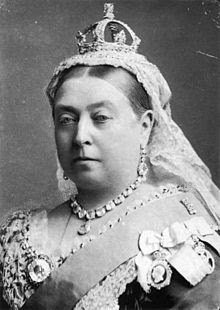

Queen Victoria was conservative in her politics and social views. Famously, at the end of the Victorian period, people could say ‘the sun never set on the British Empire.’ In 1877 Queen Victoria was made Empress of India, in a move instigated by the imperialist Disraeli. She was also happy to preside over the expansion of the British Empire, which was to stretch across the globe. She celebrated at Lord Kitchener’s victory in the Sudan she supported British involvement in the Boer War. She was an enthusiastic supporter of the British Empire. Queen Victoria was emblematic of this period. It became known as the steam age, enabling people to easily travel throughout the UK and the World. The Victorian period also witnessed great advances in science and technology. Although her popularity ebbed and flowed during her reign, towards the end of her crown, she had become a symbol of British imperialism and pride. The 19th Century was a time of unprecedented expansion for Britain in term of both industry and Empire. “An ugly baby is a very nasty object – and the prettiest is frightful.” Queen Victoria and Nineteenth-Century Britain She found pregnancy and childbirth difficult and once exclaimed. In the same year as her marriage, Queen Victoria gave birth to her first child – a daughter named Victoria. “MY DEAREST DEAREST DEAR Albert … his excessive love & affection gave me feelings of heavenly love & happiness I never could have hoped to have felt before!”

She wrote in her diary shortly after their marriage.

Victoria and Prince Albert had a very close, intimate relationship and she described the intensity of feelings towards her beloved husband. She fell in love with Prince Albert of Saxe-Coburg and Gotha in Germany. MarriageĪfter her coronation, Queen Victoria met many potential suitors from Royal houses across Europe. Queen Victoria, Extract from the Queen’s Journal, Tuesday, 20th June 1837. “Since it has pleased Providence to place me in this station, I shall do my utmost to fulfil my duty towards my country I am very young and perhaps in many, though not in all things, inexperienced, but I am sure that very few have more real good will and more real desire to do what is fit and right than I have.” On her ascendency to the throne, she said: She also took her new duties very seriously.
Queen victoria free#
One of her first decisions was to cut free from her mother and gain more independence from the controlling atmosphere she had been brought up in. He was succeeded by King William IV, but in 1837, he also passed away, meaning the crown passed onto Victoria who was aged only 18, and somewhat unprepared for the role. Victoria described her childhood as “rather melancholy.” In 1830 her grandfather George III died. She was brought up with a strict set of rules and regulations known as the ‘Kensington System’. Princess Victoria of Saxe-Coburg-Saalfeld kept Victoria very close and allowed her little real-life experience. Her early life until the age of 18 was closeted and carefully controlled by her mother and her assistant John Conroy. She was crowned Queen on 20 June 1837 and ruled until her death 63 years later in 1901. However, her father’s three brothers all died without leaving any living relatives. She was the granddaughter of George III, and her father, Edward was fourth in line to the throne. She came to epitomise an era of social conservatism and economic expansion. She ruled through a period of British imperialism with the British Empire expanding and she became Empress of India. Aged 18 she became Queen of Great Britain and she went on to rule for 63 years – at the time – she was the longest-serving Monarch in Europe. She was then succeeded by her son, King Edward VII.Short Biography of Queen Victoria (1819 –1901) This era was filled with conservative philosophies, non-existent entanglements with other European countries, advances in science (Charles Darwin’s theory of evolution), technological advancements (the telegraph and popular press), and tremendous wealth and poverty amongst the opposing classes.Īt the age of 81, Victoria died on January 22, 1901. The era itself was named after Queen Victoria, known as the Victorian Era. Queen Victoria is known for her influence on English culture. After the death of Prince Albert, Victoria went into a 25-year seclusion. Victoria married Prince Albert of Saxe-Coburg and Gotha in 1840. After the death of King William IV, Victoria became queen at the age of 18. Her father, Edward, had three older brothers however, none of them had legitimate heirs to the throne. Victoria became the heir apparent after her father died. This is the second longest reign of any of British monarch in history. Queen Victoria was queen of the United Kingdom of Great Britain and Ireland from 1837 to 1901, and empress of India from 1877 to 1901.


 0 kommentar(er)
0 kommentar(er)
